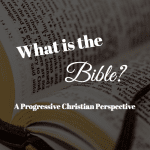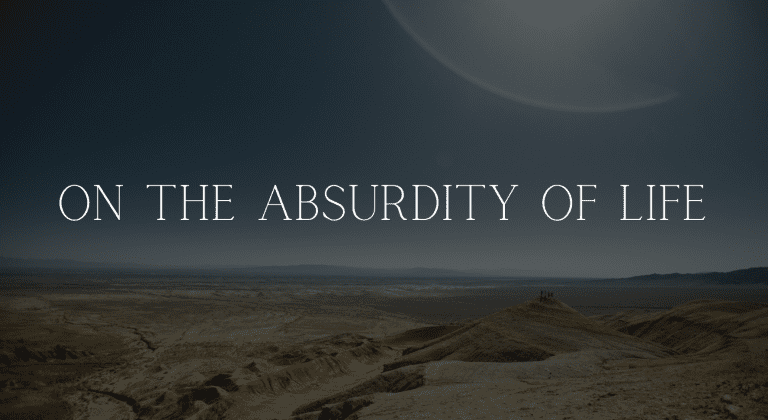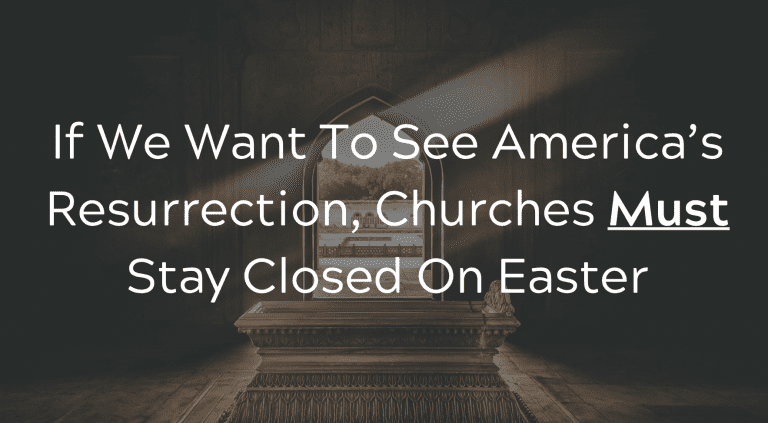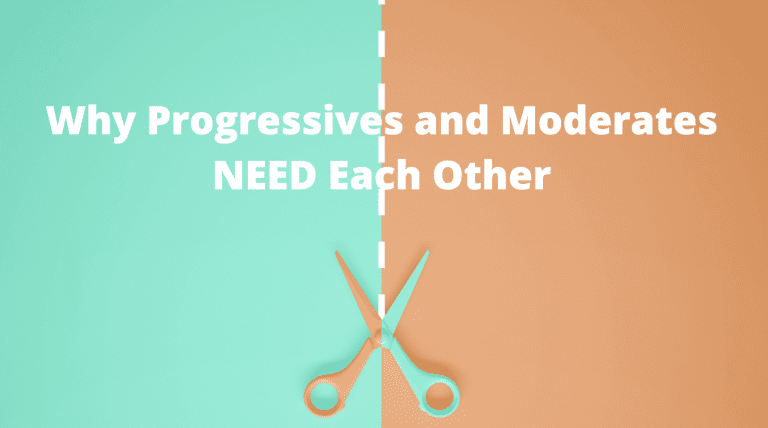This sermon was originally preached at Missiongathering Christian Church in San Diego, CA.
Today, we’re going to specifically look at the Hebrew Bible or Jewish Scriptures, commonly called by Christians “The Old Testament”. And to begin, the first note I want to make this morning is this: did you realize that it’s actually quite disrespectful to refer to the Hebrew Scriptures as “The Old Testament”? When we do that, we’re actually proclaiming some sort of Christian superiority that our Scriptures, the New Testament, are actually superior or better than the Scriptures of the Jewish people.
So, let’s start with the first question we need to explore: What is the story of the Hebrew Bible?
The Hebrew Bible emerged out of a desire for the Jewish people to solidify their history, customs, and practices. In the ancient world, most cultures primarily relied on oral traditions, meaning the passing on of their history and stories via word of mouth, as the means of keeping a unified identity.
But when writing emerged among humanity, it became clear that it would be far easier to pass on stories and laws in the written form, because it avoided differing interpretations and helped solidify everyone around the same set of words.
The Hebrew Bible tells the story of the emergence of the Jewish people in the late Bronze Age. The Jewish people emerge as a number of small yet diverse nomadic tribes that migrated to the Mediterranean from 1300 B.C. to 1000 B.C.
These tribes of people were living a period of time when the mighty Egyptian rule and reign over the world had come to an end and there was much fighting between tribes about who possessed what lands. Because of the constant moving of these nomadic tribes, there were very few strict boundaries about whose land was whose.
Dozens of tribes converged in the land of Canaan, which resulted in much conflict with the original inhabitants as well as fighting between these various tribes of people. Each tribe had its own lineage, stories, and ways of doing religion.
The primary religious tradition of the land of Canaan was called “Baalism” which centered on performing rituals to appease the gods of nature to ensure that harvest would be fruitful. They also focused on appeasing gods of fertility to ensure a fruitful lineage.
The primary god Baal was revered- his story involved a death and resurrection and this story was reenacted by the Canaanite people each year to symbolize the death of winter and the new life that emerges in the land during spring.
Most of the tribes of immigrants who migrated to Canaan adopted these religious practices as a means of ensuring that they too had a plentiful harvest.
However, in the ancient world, there was rarely a choice between one god or another. Instead, tribes often simply added on new beliefs, new rituals, and new gods to their own tribal gods as a means of ensuring that they would live a prosperous life and covered all of their ground.
So, while Canaan was primarily a nation devoted to agricultural gods like Baal, many of the nomadic tribes brought with them their own conceptions of warrior gods who they believed intervened to protect them and give them the ability to conquer other lands.
Many of the tribes that migrated to Canaan believed in a tradition called “Yahwism” where they worshipped a warrior god named Yahweh. This religion developed among and was primarily associated with refugee slaves from Egypt and carries with it some Egyptian understandings of religion.
The Yahwist tradition held that the god Yahweh had delivered his chosen tribes from bondage in Egypt and had led them to Canaan to conquer and prosper. The tradition mixed in fragments of multiple legends from various cultures and traditions, claiming them as their own.
Which is why we see in the Hebrew Bible, for instances, stories like Noah which are clearly a retelling of other ancient myths like the Epic of Gilgamesh, another tribal myth that speaks of a global flood as judgement from God and one family being chosen to repopulate the earth etc.
As these tribes converged in Canaan and did life with among one another, the Yahwist oral tradition became more and more coherent and shared among the various tribes. At the same time, the immigrants who identified with Yahweh would have continued to lean on the traditions of Baal as a means of maintaining fertile soil.
Yahweh was the god who protected them and fought for them. Baal was the god who helped their land and families prosper.
Yet over time, two identities began to emerge, and these two myths began to be seen as exclusive. Either one was a Baalist or a Yahwist. They weren’t opposed to each other, per se, but they clearly delineated a cultural difference.
By the eleventh century, the individual tribes living in Canaan began to propose the idea that joining with the other nomadic tribes under a single king was going to be essential because the army of another nation, the Philistines, was moving in on them and seeking to take over their land and enslave these tribes.
It is at this point in time that we see these tribes of nomads solidify into one new nation for the first time. They came together, fought as one unified force, and defeated the Philistines.
This victory solidified these new nations sense of identity. King David emerged as the first King of this new society, followed by his son Solomon, and it was King Solomon who first ordered a court historian to bring together the oral tradition into a single coherent narrative and rule of life.
The author of this book, retold the story of this new nation called Israel as the very plan of Yahweh from the beginning of Creation. The Yahweh of the earliest Hebrew Scriptures combined the best of Baal and Yahweh, he was a single God of creation and nature, as well as war and conquest.
The writer crafted a narrative that taught that Yahweh had made a covenant with the people of Israel, that if they trusted in God and obeyed him fully, the would prosper. This covenant was solidified by the grand retelling of the various tribes escape from Egypt, journey through the wilderness, and their victory in Canaan and among the Philistines.
All of these grand narratives were the prologue to the culmination, which was the formation of the great nation of Israel.
This is how the first portion of the Hebrew Bible, the Torah emerges. But what we have right now, in this story, isn’t a new distinct religion per se. It’s not the organized system of Judaism that we now know today.
No, that wouldn’t emerge until later, when the new nation of Israel was utterly destroyed in 586 BC when the Babylonian Empire conquered and decimated the nation, killing thousands and exiling the remaining citizens of Israel to Babylon.
In the in between period between the emergence of Israel as a nation and the Babylonian Exile, Judaism began to emerge as a distinct religion. Prophets rose up among the people, serving as essentially activists, observing the political and social landscape in and around the new nation and warning the people about what was obviously coming.
There prophets predicted the Babylonian exile and many other major defeats, which then were interpreted through the tribal lens which said that the reasons Israel was destroyed was because it had been unfaithful to Yahweh.
This is where the writings of the Prophets began to emerge.
While in exile, the nation of Israel began to develop a formal religion that we now recognize as Judaism. In exile, these oral and written traditions were mingled together and told as a story of hope, even in the midst of exile, and a promise that one day, God would restore the national sovereignty of Israel.
We see synagogues emerging as means of maintaining the culture and traditions of Israel in a foreign land, a place to remember, to practice, and to long for what once had been and what they one day hoped would come again.
The hope of Judaism was in the idea of something called a “covenant”- or a commitment between God and the Hebrew people, that through faithful obedience to God, God would in turn give the Hebrew people a land that would prosper, so much so that eventually, they would be the rulers of all of Creation.
Covenant to God and maintaining distinct from other nations and religious became the driving force of the new Jewish religion.
Jewish people began to believe that their history and laws emerged from Yahweh himself, and that Yahweh was the one and only true God that could control all elements of life and creation for the entire world. This idea of obedience to a single God and a single literary tradition emerges for the first time on the stage of human history.
The remainder of the Hebrew Bible emerges as tools to help the community of Israel united in their devotion and obedience to God and distinct in their common tradition and identity.
The Psalms emerge as texts to be used in liturgy, as prayers and songs, that remind the Hebrew people of the greatness of Yahweh, the stories of their past, their hope for the future, and the consequences of their disobedience to God. The proverbs are short wisdom sayings to help guide people to live a righteous life.
The prophets are calls to obedience to God and faithfulness to the traditions.
This is what the Hebrew Bible becomes. A library of myths, laws, histories, liturgies, and warnings to shape and guide the Jewish people, both religiously and ethnically, in their pursuit of the covenant that God made with them.
When we understand the historical context behind the writing, things become a lot clearer don’t they?
Now that we have a grasp of what the purpose of the Hebrew Bible was, it becomes clear to us the ways in which the idea of God that we find in the Hebrew Bible was created through combining ancient tribal gods- Yahweh and Baal- and then becomes the great advocate of the new nation of Israel, we’re told, from the earliest days of creation.
It makes sense to us because these sorts of myths of a God favoring one group of people, one culture, one belief system over another isn’t unique to the Jewish people. This is how most religions emerged in the ancient world, as well as in the modern world.
Let me explain a little bit:
Did you know that the founding fathers of the United States took the myth of the Hebrew Bible and copied it in their own retelling of the formation of our nation?
How we, Americans, fled from oppression in England as various bands of tribes, and came to this nation with the promise from God that we would be given the land we now occupy, that we had permission to slaughter the original inhabitants, and that we would rule the world as the beacon of righteousness?
Do you realize how the same ideas that the Hebrew Bible puts forward- that if a nation is unfaithful to God by compromising any of the values that make it unique, that God would judge them- is the very thing that thousands of people cry out whenever a tragedy or natural disaster takes place in our nation?
I am pointing this out to highlight a point that I made last week- it’s easy for us in the 21st century to look back at the Hebrew Bible with a sense of superiority and judgement.
When we understand how it came to be and we see the ways in which a nation created a text and a tradition as a means of perpetuating its own prosperity at the expense of other nations and peoples, we think “How archaic!”.
Yet even in our modern day, 4,000 years after these texts began to be written, we are perpetuating the same myths, but on a much larger and more destructive scale.
We are not better than the ancient Hebrew people or Egyptians or Babylonians or Saxons or Celts. No, we just have more technology.
And it is in this sense that studying the Hebrew Bible is so essential for us.
Because it becomes a mirror where we are provoked to look at ourselves through the characters of the nation of Israel and reflect on the ways that we are also creating a God who justifies our actions and our culture above others.
It becomes a text where we can see the very raw and real consequences of greed, selfishness, and injustice- it literally results in what the Hebrew people called “The judgement of God”- and unless we heed the warnings of those ancient prophets to do justice, love mercy, and walk humbly before God, we too could end up like so many of the people in the text- destroyed, not by God, but by our own greed.
The Hebrew Bible also calls us back into the forgotten rhythms of our ancient ancestors- rhythms that are hardwired into creation. The rhythms of birth, life, death, and resurrection. Rhythms of exile and return. The fundamental message that the world calls us to hear, but that we in our modern superiority ignore.
See, the ancients new and respected the world. They obeyed and participated in the rhythms of the created order. Every day went through the same rhythm of suns rise, noon day and sunset. Every year went through the same rhythm of spring, summer, fall, and winter. And history and individual life goes through those same rhythms.
The stories of the Hebrew Bible are a constant reminder of us of the way that God created the world, the fundamental rhythms hardwired into creation. They call us to live in alignment with these rhythms, to remember them, and to respect them if we desire to prosper. They also show us what sort of chaos is unleashed when we try to live out of sync with these rhythms.
The Hebrew Bible teaches us the importance of knowing and remembering our history, and living in light of the lessons learned in the past. The Jewish religion developed a series of feasts that, every year, called the Jewish people back to the past, the bravery and mistakes of their ancestors, and the lessons that they learned.
This is what Passover, Yom Kippur, Sukkot, and all of the other feasts sought to be.
But potentially most importantly, the Hebrew Bible calls us to move beyond it. To learn from it and to progress forward. Because while it is the story of one particular ethnic group, it’s also the story of all of humanity. The constant, repetitive nature of the stories is of a group of people that have an idea, make mistakes, face the consequence, and move forward.
The direction of the Hebrew Bible is towards progress. It’s towards evolution. It’s towards improvement. It’s towards equality and inclusion.
Even in the narrative arc of the Hebrew Bible, we see that while the story begins with a chosen tribe of people, the arc bends and promises a day when all nations, in all of their diversity function in justice and peace under the same God.
So as we engage with the Hebrew Bible, we too are called into dialogue and discussion with the text, asking “Is this right?” “How could they have done this differently?” and “How do we do this today?”
See, the beauty of the Jewish tradition that we have largely lost in modern Christianity is that it widely acknowledged and understood that the Hebrew Bible isn’t an innerant text. It’s not the “final word” of truth.
No, it’s authority doesn’t come from being right, but from being our story. It’s the story that the Jewish people and later that Christian people all relate to. The language, the myths, the ideas, the theology, the laws. It has authority because all of us give it authority, and we shape our lives and society around it.
And because of this, Jewish people and the early Christians have always argued with the text. They’ve always disagreed with and amended the text. They’ve always come up with new interpretations and understandings of the text.
Because any good story must have more than one meaning.
You know what I mean? For instance, I saw “Call Me By Your Name” six times, and every time I watched the movie, I noticed different aspects and walked away with a different message.
How could the same words results in six different experiences?
Because it’s a good story.
And this is how all sacred scripture is meant to be used. This is why we say it’s inspired and breathed out by God. Because beneath the words on the page is an endless realm of meaning and lessons that cant be explained just by looking at the words on a page.
The inspiration of scripture is a mystery. But when we engage with the Hebrew Bible in this way, with revereance and awe, allowing the Spirit to speak through these ancient words to our modern minds, we will be filled and transformed and refined and nourished.
Now, by way of conclusion, I want to build upon this idea to ask “How did the Jewish people engage with the Bible, and how should we?”
In the Jewish tradition, there is a principle called midrash which was a way that Jewish people were to engage iwht the Hebrew Bible. Midrash can best be understood in the image of an argument and a discussion around a table, where folks would read the text and ask “What does it mean to us today?”
Jewish scholar Rabbi Lord Jonathan Sacks describes midrash in the following way:
“Midrash is the child of prophesy, though in antoher sense. The prophets were the intepreters of history. They spoke to their generation and their times. Lacking prophecy, the Rabbis turned to the biblical text to hear within the word spoken for all time, the specific resonsae for this tiem. Unlike the plain and simple meaning, midrash is the quest for the meaning of the text as if it was spoken not then, but now. Midrash is the word spoken in the past bust still active in the present. “
In the Jewish tradition, there is another text called The Talmud which contains the midrash of prominent Rabbi’s throughout the ages. In it, we find unique and sometimes very strange interpetations of the Hebrew Bible that relate to the day that a Rabbi was living in.
In the Talmud itself, it speaks these words about the Hebrew Bible:
“The various characters and stories in the Bible signify the different qualitifes of one person and of all people and the different stages of this persons spiritual path.”- The Talmud, Kidushin
Now, let me be clear. This is not how I was taught to interpret the Bible in Bible college. This is not how most evangelical churches engage with the Bible.
But this is how the Jewish people have always engaged with the text. A living text that always provides new perspectives and new meanings for a new day. The question was never about whether or not a story was true or literal. It was always dabout what the Spirit was speaking today.
The Hebrew Bible is a gift to us, church, because it invites us into a conversation that has been going on for thousands of years. We’re invited to listen and learn. To reflect and refine. To ask the Spirit to speak to us through these ancient words a fresh word for our day.
And we have every reason to believe that the Spirit of God will be faithful to do so for us as God has done for multiplied billions around the world.
So again, I want to invite you to pick up your Hebrew Bible this week. Prayerfully read it, wrestle with, engage with it, question it, and receive the manifold gifts it has to offer your life and the world that we live in today.
Amen?











